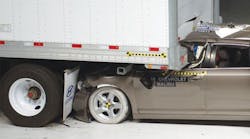Rear impact guards (also known as underride guards and ICC bumpers) have been required on most commercial vehicles for nearly 70 years, but they are not included on the list of components to be checked in the required annual vehicle inspection. The Federal Motor Carrier Safety Administration on Dec. 29 published a Notice of Proposed Rulemaking to address the matter.
The NPRM would simply add impact guards to Appendix G of Subchapter B of Chapter III of title 49, Code of Federal Regulations, “Minimum Periodic Inspection Standards.” Additionally, FMCSA proposes to amend the Federal Motor Carrier Safety Regulations (FMCSRs) to maintain consistency with rear impact guard labeling requirements and exclusion for certain types of trailers, as included in the National Highway Traffic Safety Administration’s own set of Federal Motor Vehicle Safety Standards (FMVSSs) since 2004 but never incorporated into the FMCSRs.
The NPRM stems from a request by the Commercial Vehicle Safety Alliance—the umbrella organization of North American roadside inspection agencies—as well as U.S. Government Accountability Office research and interest from Congress.
“As the amendments proposed by this rule are primarily technical changes that clarify existing requirements and improve enforcement consistency, FMCSA believes there will be stakeholder support for this initiative,” the filing states. “Neither the labeling requirements that would result from this proposed rule nor the exclusion of [road construction controlled] horizontal discharge semitrailers from these requirements would result in incremental costs or benefits.”
According to FMCSA's Motor Carrier Management Information System (MCMIS), out of approximately 5.8 million regulatory violations identified during inspections in 2017, only approximately 2,400—or about 0.041%—were rear impact guard violations, the filing notes.
Indeed, the CVSA petition was developed following an August 2018 initiative in which roadside inspectors focused on rear impact guards. CVSA subsequently made Operational Policy changes “to NOT cite a violation for a missing certification label” in the US, an interpretation that found the label requirement pertains to the manufacturer, not the end-user.
However, that August 2018 enforcement push got the attention of fleets and trailer repair shops. Strict enforcement of the label requirement and the improper application of the rules on exempt vehicles were the source of complaints at the TMC fall meeting in September; later in the fall, calls started coming into the National Trailer Dealers Association.
“It’s become kind of a contentious issue, apparently,” NTDA President Gwen Brown told Trailer/Body BUILDERS at the time.
As an example, Brown suggested an incident where a trailer built by one OEM was involved in a rear-end accident and towed to a nearby trailer dealership affiliated with a different manufacturer. The repair shop likely would not stock the OEM replacement rear impact guard. And, depending on the interpretation of the label standards, the shop could be exposed to liability by installing a different guard. Sometimes there is also a matter of competition and lack of cooperation among repair facilities representing different trailer manufacturers, she noted.
The NPRM does not address the matter of labeling trailers after a repair.
Comments on the proposed rule may be filed through March 1, 2021. The docket, FMCSA-2019-0211, is available at regulations.gov.




